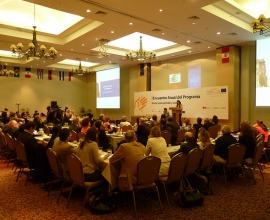First Programme Meeting
"Review, Learn, Advance"
The EUROsociAL II programme was officially launched in 2011, and, after a first year of programming with the participating countries, the actions and activities are now under way and being implemented at a good pace. In the ten thematic areas, EUROsociAL II covers key problem areas on the regional agenda, ones shared between the countries and defined as priorities for their processes of public policy reform. The programme has been maturing, and now is a perfect time to reflect on its course and future, i.e., the orientation of the actions and the expected results. But, above all, this is the moment to consider how to solidify the progress achieved and deepen it with broader and more substantial initiatives, whether cross-cutting or intersectoral in nature. To carry out this cross-cutting or intersectoral exercise, the inputs of the members of the Steering Committee and other prominent experts and specialists in the different thematic areas will help elevate the capacity, the approach and the impact of the programme. Therefore, the aim is to start a reflection process to share experiences, review the consistency and coordination of the EUROsociAL II intervention, and rethink the orientation of the actions in light of the key issues on the Latin American agenda. This process will culminate in a meeting that will also serve to build the programme and foster a sense ownership on the part of its main stakeholders. In EUROsociAL, multiple stakeholders participate in different roles, complementing each other: the European Commission, the Steering Committee, the coordinating partners, the specialised operational partners that implement the activities, the Delegations of the European Union (DEUs) in the region, and the national focal points. This complex institutional architecture is a great strength of the programme, one that puts at the service of Latin American institutions a powerful network of experiences, capacities, knowledge and know-how. Nevertheless, to make the most of this architecture, it is necessary to create spaces that allow us to share these experiences, learn from others, agree on ways to advance together and innovate, and, clearly, to assure consistency in programme actions.

